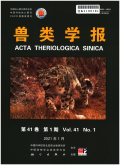兽类学报2024,Vol.44Issue(3):344-350,7.DOI:10.16829/j.slxb.150804
圈养马麝的攻击性与粪样类固醇激素水平及麝香分泌的关系
Relationship between aggressiveness,fecal steroid levels and musk secre-tion in captive Alpine musk deer(Moschus chrysogaster)
摘要
Abstract
The development and expression of animal behavior are regulated by hormones.The personality traits of ani-mals,such as aggressiveness are closely related to their hormone levels,which affects their growth and reproduction.This study was conducted from 2 October to 15 December 2021 at Xinglongshan Musk Deer Breeding Center of Gansu Province.The methods of focal sampling and all events recording were used to record the behavior of 53 male musk deer,and the levels of fecal steroids were detected by non-invasive sampling method.The relationship between the ag-gressiveness of male musk deer and the levels of fecal cortisol,testosterone,musk secretion and musk ketone were ana-lyzed.The results showed that aggressiveness of musk deer was significantly positively correlated with cortisol level(r=0.311,P=0.023).The level of cortisol in aggressive individuals(60.41±2.82)ng/g was significantly higher than that in less aggressive individuals(49.35±4.32)ng/g.There was a significant positive correlation between aggressive-ness of musk deer and testosterone level(r=0.326,P=0.017).The level of testosterone in aggressive individuals(101.27±4.94)ng/g was significantly higher than that in less aggressive individuals(84.48±4.10)ng/g.There was a significant negative correlation between aggressiveness of musk deer and musk secretion(r=-0.282,P=0.041).The musk secretion of less aggressive individuals(10.62±0.58)g was significantly higher than that of aggressive individu-als(8.28±0.91)g.There was a significant negative correlation between aggressiveness of musk deer and muscone con-tent(r=-0.285,P=0.039).The content of muscone in less aggressive individuals(1.98±0.18)%was significantly higher than that in aggressive individuals(1.31±0.23)%.Based on the results of this study,in the practice of musk deer domestication,it is necessary to avoid the strong aggressive individuals in the same group,and to optimize the com-munity structure of captive musk deer based on the rapid assessment of aggression and the real-time monitoring of fecal hormones,so as to reduce the community stress of musk deer and improve the musk secretion of individuals.The results of this study can provide an important reference for ex-situ conservation of endangered musk deer and improving the pro-duction of medicinal musk.关键词
马麝/攻击性/粪样类固醇激素/麝香分泌/麝香酮Key words
Alpine musk deer(Moschus chrysogaster)/Aggressiveness/Fecal steroid/Musk secretion/Musk ketone分类
生物科学引用本文复制引用
王晓龙,吴佳忆,周鑫,吕青昕,申立泉,耿硕,孟秀祥..圈养马麝的攻击性与粪样类固醇激素水平及麝香分泌的关系[J].兽类学报,2024,44(3):344-350,7.基金项目
国家自然科学基金(32170489,32211530443) (32170489,32211530443)

